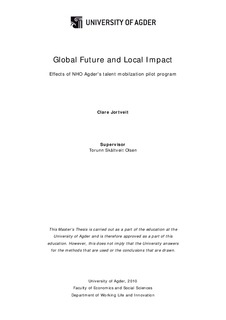| dc.description.abstract | This dissertation is undertaken as the final requirement of the Master of Management degree at the
University of Agder. The topic is the Global Future talent mobilization pilot program which was
launched in 2007 with the goals of qualifying highly educated immigrants for management and board
positions as well as contributing to growth in the Agder region. The central research questions are:
What impact has Global Future had on the work life of participants two years later? How can the
experiences of participants and stakeholders be used to further develop and improve the Global Future
program in order to address integration and full utilization of labor resources in Agder? Is
empowerment of the individual sufficient to achieve the goals of integration and full utilization of labor
resources?
Global Future is viewed in a cultural perspective with focus on identity development, acculturation,
rolemodeling,
mentoring and networking. The literature selection reflects this focus, drawing heavily
on the work of Gert Hofstede (2001) in the area of culture and organizations and Bhagat and London
(1999) in identity development and acculturation. The qualitative research design is crosssectional,
involving interviews, secondary analysis, thematic analysis and narrative analysis. Global Future
participants, program designers from NHO, and human resource managers at two prominent
companies, Agder Energi and Aker Solutions, have been interviewed, and this data makes up the
greatest part of the research. The participants' experiences and insights are presented as cases grouped
by their employment status when they started the program (unemployed, underemployed, or
successful). The most important findings are in the areas of rolemodeling,
mentoring, identity, career
ambition and employability and obstacles and attitudes. The findings show that the program has had the
greatest impact on the underemployed group, substantial impact on the unemployed group and virtually
no impact on the successful group. Participants in the underemployed group experienced the greatest
impact on their personal development and identity, and this seems also to have impacted their careers,
albeit indirectly. The least successful elements of the program proved to be mentoring, networking and
ties to private enterprise. Participant insights and recent studies on mentoring and networking form the
basis for suggestions for developing and improving the Global Future program to better address
integration and full utilization of labor resources in the region. Empowerment of the individual is a step toward integration and full labor resources, but it is not adequate alone. In addition, employers must
understand the obstacles immigrants meet when applying for employment in terms of language and
formal qualifications, and create workplaces characterized by cultural tolerance and inclusion. | en_US |
